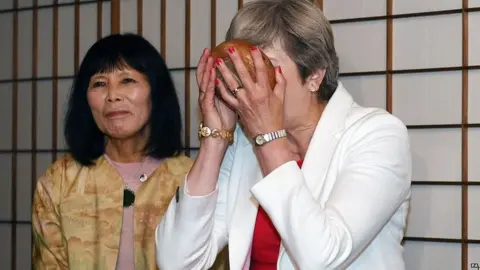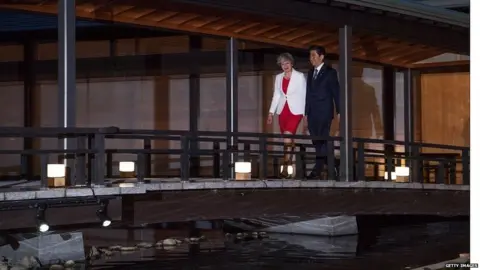China must 'pressure' North Korea over weapons tests - May
Theresa May has said China must do more to help end North Korea's "illegal and provocative" weapons testing.
On a visit to Japan, the prime minister welcomed UN condemnation of Pyongyang and said the UK was looking at ways of exerting further pressure on the North Korean regime, including from China.
Mrs May is also aiming to allay Japan's concerns over Brexit and drum up trade.
She said Japanese firms continued to make "important" investments in the UK as EU withdrawal was being negotiated.
She hailed British carmaker Aston Martin's decision to invest £500m in Japan as a sign of the strength of the two countries' economic partnership.
The luxury brand announced on Wednesday it would significantly step up its exports to Japan, open a number of new offices next year and expand its dealer network.
Japan is preoccupied with the issue of North Korea's missile test over its northern Hokkaido island.
Speaking to the BBC after arriving for a three day visit, Mrs May urged China to exert its influence over Pyongyang.
"I want to work with other international partners to do what we all want to do which is to stop North Korea from conducting these illegal activities," she said.
 PA
PA Getty Images
Getty Images"These are illegal tests. It is outrageous, it is provocative and they should be stopped."
The UK was working to see what "further pressure" could be brought on North Korea, including extending sanctions, and the role that China could play in facilitating such action.
But asked about the comments, a Chinese foreign ministry spokesman said the focus should be on de-escalating tensions in the Korean peninsula and "just chanting about sanctions" was not the answer.
'Unprecedented threat'
Meeting late on Tuesday in New York, the United Nations Security Council called the launch "outrageous", demanding North Korea cease all missile testing.
But North Korea has signalled plans for more launches, suggesting its firing of a missile over Japan was "the first step" of military operations in the Pacific.
Mr Abe greeted his counterpart when she arrived in Kyoto before the two leaders went to a teahouse for a traditional tea-drinking ceremony, followed by a formal dinner at the Kyoto State Guest House.
They then took the bullet train to Tokyo, where formal talks will take place on Thursday.
Downing Street said the two leaders had discussed the Brexit process to date and the UK's position on key issues.
Mrs May, who is being accompanied on the trip by International Trade Secretary Liam Fox and a delegation of business leaders drawn from a range of sectors, told her counterpart that the UK saw Japan's proposed free trade deal with the EU as a "good basis" for the beginning of a future UK trading agreement with Japan.
The UK is unable to sign any bilateral deals until it has left the EU in 2019.
'Longstanding partner'
Japan has been forthright in expressing concerns about Brexit's impact on its UK-based firms, which employ about 140,000 people.
Mr Abe will be seeking assurances from Theresa May about what kind of relationship the UK will have with the EU post-Brexit and that this will not be detrimental to Japanese businesses with bases in the UK.
Although the UK would be leaving the single market, Mrs May told journalists she had also made clear she wanted to minimise disruption for foreign investors by putting in place transitional arrangements to ensure a "smooth path" after the UK leaves in 2019.
She added: "Japan is a longstanding partner of the UK with significant investments in the UK. We have seen Softbank, Toyota investing in the UK since the EU referendum took place."
"These are important developments for our economy and relationship with Japan."
A special adviser to Mr Abe, Tomohiko Taniguchi, told BBC Radio 4's Today there was uneasiness about Brexit within the Japanese business community but talk of a crisis in relations was over-stated as Japanese firms had an "inherent preference" for doing business in Britain.
Nomura bank, Hitachi and carmakers Honda, Nissan and Toyota all have bases in the UK.
Earlier this year, Nissan said it would build two new models - the new Qashqai and X-Trail - at its Sunderland plant after the government promised that competitiveness would not be damaged by EU withdrawal.
